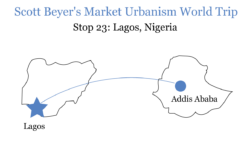Tourist Visas: A Path To Corruption
Third World countries sabotage their goal of attracting tourists and investors by making it difficult for either group to enter.
I am currently on a 1.5-year tour of the Global South, spending 6 months each in Latin America, Africa and Asia. Going in, the goal of my trip was for investing purposes: I wanted to see which developing world countries best represented the future, based on their population growth and economic openness.
But the trip has morphed into something different: a mere attempt to visit whichever country allows me in. At issue is the global travel visa regime.
The problem is particularly bad in Africa. While every Latin American country I visited is open to tourists, African countries are a mixed bag, and the poorer they are, the stricter they often seem to be (maybe that’s unsurprising).
Typically, I’ve found that for a U.S. citizen to enter certain African countries, they must do some combo of the following:
- Purchase a flight and hotel reservation in advance
- Write a self-introduction letter
- Get an invitation letter from an incorporated business within that country
- Fill out long, complicated web forms
- Wait several weeks for an approval, only to find that the agency rejects the application on a technicality (while still keeping the money)
All this, to reiterate, is required for tourists who want to take a simple vacation.
These visa processes have totally altered my Africa route. I have gone to countries that were not previously in the plans (Zambia, Rwanda, Morocco) because they had visa-on-arrival programs – or no requirement at all. I’ve avoided others that I first wanted to visit (Ghana, Democratic Republic of the Congo), because it felt risky to purchase accommodations without knowing if they’d approve my visa. I skipped over Egypt on the sole basis that its visa application website form did not work.
 Nigeria was the one country where I chose to endure these protocols – giving me insight into the true motive for their existence.
Nigeria was the one country where I chose to endure these protocols – giving me insight into the true motive for their existence.
In May, I bought a plane ticket, hotel reservation, and paid $160 for a visa application. On the day of the flight, it still had not been approved, and Nigerian Immigration Service was non-communicative. So I decided to fly into Lagos’ Murtala Muhammed Airport anyway and see what happened.
Once there, I was detained for 12 hours, harassed by NIS officers, had my passport confiscated, and had my visa rejected (they claimed the self-intro letter was written improperly, and that I should’ve hired a lawyer). The detention room was full of others in the same situation.
It was not until speaking with a Nigerian friend that I was told what to do: pay a bribe. $285 later, a smiling NIS officer returned with my passport and an approved visa slip.
This, I later found out, is how life goes in Nigeria. Tom Friedman writes in The Lexus and the Olive Tree that Nigeria has long been among the world’s main kleptocracies, meaning it’s an economic system that runs on bribery. I found in Lagos that everyone from retail store clerks to government officials ask for “tips” and use other extortion tactics.
NIS plays into this system by setting up a regulatory infrastructure that it weaponizes against travelers. For those flying in, NIS creates a visa process that is impossible to comply with, then holds that non-compliance over people to extract bribes. For those flying out, NIS has created a lengthy checkpoint process full of officers who request – either sheepishly or aggressively – for “blessings”. For example, I paid $4 to one TSA-style officer to prevent her from tossing my food and toiletries.
Extortion has long been a problem at African airports. Nigeria is known as having the worst. The government there is aiming to crack down on it, arresting corrupt officers and banning certain behavior. I had to smirk at the “We do not condone extortion” signs hanging all throughout the airport, as my own bribe-driven visa application was being processed. But it’s hard to police corruption when there’s a regulatory architecture that encourages it, and some of the money likely gets kicked back to the anti-corruption officers in charge of enforcement.
The obvious answer is for African countries (or others that have tough visa processes) to weigh the costs versus benefits of existing regulations. The U.S. has a tough visa process, but that is because immigration demands are high and many who come to “visit” end up overstaying their visa. This arguably merits a tough vetting process.
But in countries like Nigeria, where the average person lives on a few thousand per year, there is little advantage in keeping out U.S. tourists who will spend that amount in just their few weeks there. The regulations in fact have no apparent benefit, and can instead be viewed as parasitic rent-seeking. NIS officers make money by extorting tourists; but because that means less tourism overall, it means less economic opportunities for the average Nigerian.
The African Union has called for a “Visa Free Africa”. It argues that easing inter-continental travel will include benefits such as “boosting intra-Africa trade, commerce and tourism” and “facilitating labour mobility”. They’re exactly right: countries that remove tourist visas are making a statement about their basic openness, economically and culturally, to the world. Keeping such barriers in place not only invites corruption, but speaks to a desire for isolationism.
Cover image use authorized under Creative Commons Attribution Share-Alike 4.0 license.
Graphic Credit: The Market Urbanist.
Catalyst articles by Scott Beyer | Full Biography and Publications
